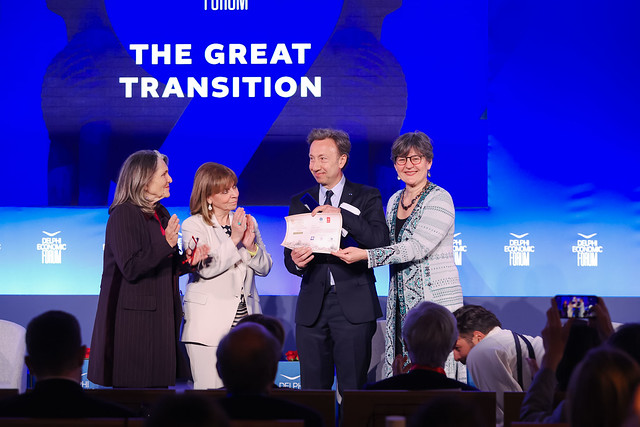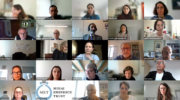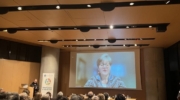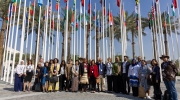Europa Nostra discusses Climate Action and Western Balkans integration at the Delphi Economic Forum 2024
The 9th Annual Meeting of the Delphi Economic Forum was held from 10 – 13 April 2024 in the historic town of Delphi, Greece. Under the Patronage of H.E. Ms. Katerina Sakellaropoulou, the President of the Hellenic Republic, the four-day Forum brought together global leaders from politics, business, diplomacy, and civil society from all over the world.
Structured around six pivotal themes – Geopolitics, the Planet, Sustainable Economy and Finance, Global Future, Education, and People – the Forum saw many high profile speeches, roundtable discussions, and debates. Along with the valuable networking opportunities, the event allowed attendees to engage in dialogue aimed at igniting change and translate ideas into tangible action.
For the third consecutive year, Europa Nostra and Elliniki Etairia (ELLET) attended the Forum and jointly hosted five events. Collectively, these events helped to shape the discussions and outcomes of the Forum, and underscored Europa Nostra and ELLET’s shared commitment to place cultural heritage at the centre of climate and political action.
Costa Carras European Citizens Award 2024 presented in a high-level ceremony
The presentation ceremony of the Costa Carras European Citizens Awards for the Safeguard of Endangered Cultural and Natural Heritage 2024 took place on 10 April, in Delphi, in the presence of H.E. the President of the Hellenic Republic, Ms Katerina Sakellaropoulou. Over 150 participants honoured the winner of the Golden Award, Stéphane Bern, and the joint winners of the Silver Award, the Greek NGO Archilochos – Cultural Association of Paros and the Turkish NGO Haydarpaşa Solidarity for Society, City and Environment.
Accelerating EU / Western Balkans Integration: The Untapped Potential of our Shared Heritage
Held on 11 April, this session was organised by Europa Nostra and the Europa Nostra Heritage Hub in Athens, in the frame of the EU-funded European Heritage Hub pilot project. Against a backdrop of a welcome acceleration of the EU enlargement agenda, this panel underscored the untapped potential of our shared cultural heritage in bridging citizens and institutions across EU Member States and candidate states from the Western Balkans. Special focus was given to the vital role of cities and civil society organisations in mobilising citizens and communities to safeguard our shared values and cultural heritage. This includes not only efforts within their own cities and regions but also collaboration across borders, in partnership with neighbouring countries.
Starting now ▶️ In our 2nd event today at @delphi_forum, we look into EU & #WesternBalkans integration. #CulturalHeritage plays a vital role building bridges between citizens & institutions of MS & candidate countries. Our SG @SneskaEN is among speakers 👇 pic.twitter.com/hdkqmcAlJU
— Europa Nostra (@europanostra) April 11, 2024
Moderated by Mary Adamopoulou, reporter at the Greek daily newspaper TA NEA, the panel featured distinguished speakers, including Haris Doukas, Mayor of Athens; Lydia Carras, Founder and Vice-President of Elliniki Etairia; Sneška Quaedvlieg-Mihailović, Secretary General of Europa Nostra; and Vesna Marjanović, Secretary General of Europa Nostra Serbia.
During the discussion, the Mayor of Athens, Harris Doukas, shared their efforts to further democratise the city through bottom-up approaches such as the initiative ‘SynAthina’. A notable aspect of Athens’ strategy is its use of cultural heritage to attract international guests and visitors, particularly from the Western Balkans. Traditional music and cultural showcases are employed to present Athens not only as a gateway but also as a final destination, emphasising its identity as a city for its people, not just for tourists. However, with the growth of tourism comes the challenge of managing its impact on residents and infrastructure. The Mayor of Athens outlined plans to develop strategies to alleviate tourism pressure, ensuring the protection of the city’s residents while promoting sustainable development.
Lydia Carras, Founder and Vice-President of Elliniki Etairia underscored the critical role of community mobilisation in preserving cultural heritage. ELLET, in collaboration with citizens, plays a pivotal role in identifying and safeguarding significant cultural sites.
Sneška Quaedvlieg-Mihailović, Secretary General of Europa Nostra, recognised the rich shared heritage in the Western Balkans and emphasised the need for cross-border collaboration to preserve it. She called for a collective effort to address challenges such as unsustainable development and underlined the role of civil society organisations in advocating for democracy and the rule of law.
Vesna Marjanović, Secretary General of Europa Nostra Serbia, stressed the significant role of cultural heritage in bridging communities and fostering understanding. She highlighted the importance of exchanging experiences and expertise within the European heritage community to address challenges and promote sustainable development.
A Heritage Walk exploring the ancient Path of Delphi to Chrysso
On 11 April, ELLET and Europa Nostra gathered various stakeholders to embark on a journey along the ancient Path leading from Delphi to the ancient port of Kirra. The route was inspired by ELLET’s “Greek Paths of Culture” project, which aims to preserve and raise public awareness of Greece’s natural and cultural heritage.

Photo credit: Europa Nostra
During the walk, a diverse group of participants had the opportunity to delve into the history of Delphi and learn about the significance of biodiversity in the region. Local archaeologists accompanied the group, providing insights into the Delphian landscape and discussing opportunities for creative economic development in the area.
From COP28 to COP29 and Beyond: Championing Culture-based Climate Action
Taking place on 11 April, this session was organised by Europa Nostra within the framework of the EU-funded European Heritage Hub pilot project. This discussion centred around the Global Call to Action for Culture-Based Climate Action, launched by civil society ahead of COP 28 in Dubai, and the subsequent historic launch of the related Group of Friends during a Ministerial meeting chaired by the UAE and Brazil. The panel convened global and European champions of culture-based climate action, aiming to build the momentum for formal recognition of the vital role of culture, cultural heritage, and ancestral intelligence for a more effective climate action at COP 29 in Baku (Azerbaijan) and COP 30 in Bélem (Brazil).
We’re live! After history was made at #COP28 with the launch of the Group of Friends of Culture-Based Climate Action, today at @delphi_forum we hear from experts leading these efforts & advocating for further recognition at #COP29. Stay tuned! pic.twitter.com/vqbyYrXS99
— Europa Nostra (@europanostra) April 11, 2024
The moderator, Nik Gowing, Co-Director of Thinking the Unthinkable (United Kingdom), initiated the discussion by reflecting on the accelerated pace of climate change, surpassing scientists’ predictions. He posed a pivotal question: how can culture contribute to mitigating these effects?
The first speaker, HRH Princess Dana Firas, Special Envoy of the Climate Heritage Network, Vice-President of ICOMOS, and President of the Petra National Trust (Jordan), highlighted the significant momentum generated at COP 28 through the establishment of the Group of Friends, dedicated to advancing a Joint Work Decision for the upcoming global climate conference. “COP 29 in Baku can be groundbreaking by ensuring that its formal decision includes culture-based climate action with practical actions and investments,” she stated.
Christos Dimas, Deputy Minister of Culture of the Hellenic Republic, affirmed: “Culture for climate action has been underused by the global community in the last decade, although it can play a very important role in passing messages to our society and in shifting the paradigm”. The Hellenic Republic was among the over 30 Ministers or government representatives that attended the historic inaugural meeting of the Group of Friends, recognising the key role of culture for transformative climate action.
Alexandra Mitsotakis, President and Co-Founder of the World Human Forum (Greece), emphasised the importance of education and social sustainability when it comes to saving and celebrating our planet: “Scientists, politicians and civil society have failed to awaken the consciousness of society, but culture and the arts can help”.
George Kremlis, President of the Circular Economy and Climate Institute of the EPLO (Greece), emphasised the need to build a new narrative on mainstreaming culture both tangible and intangible in climate action. He underscored that “culture is a driver to develop a new mindset of making ourselves resilient, to raise awareness and create a new movement that we all need to embrace to reduce emissions”.
George Kremlis, President of the Circular Economy & Climate Institute of @eplo_news, underscored that “Culture is a driver to develop a new mindset of making ourselves resilient, to raise awareness and create a new movement that we all need to embrace to reduce emissions” pic.twitter.com/1GI7NEy5DY
— Europa Nostra (@europanostra) April 11, 2024
Sneška Quaedvlieg-Mihailović, Secretary General of Europa Nostra and Leader of the European Heritage Hub, applauded the progress made in recent years for the due recognition of culture’s potential to reach sustainability and climate action goals. She also called for full integration of heritage in climate action: “I wish that we all take along the spirit of Delphi and Apollo at COP 29. Culture-based climate action brings better quality of life, harmony between communities and with nature”, she stated.
Finally, Fariz Rzayev, Deputy Minister of Foreign Affairs of Azerbaijan, the host of the upcoming COP 29 in November 2024, expressed the government’s commitment to raising awareness and fostering further action to safeguard our planet, drawing upon our shared culture: “We are talking to stakeholders and other governments to collect ideas and best practices to see how we can build a consensus altogether in order to develop a culture of responsible and sustainable citizenship”.
Thank you for joining us today! Together we can advance the movement to recognise the socio-cultural enabling conditions of transformative climate action on a global scale. Let us build bridges between civil society, governments and cities to succeed. More updates soon! pic.twitter.com/U295EvobWN
— Europa Nostra (@europanostra) April 11, 2024
This conversation must continue and be elevated to fully embrace the opportunity presented by the next COP to further promote a way of life with more beauty, sustainability and engagement with our nature. As it unfolds on the European continent, we stand poised to lead by example and ensure the inclusion of social and cultural pillars to the overall sustainability agenda.
In Conversation with HRH Princess Dana Firas and Sneška Quaedvlieg-Mihailović
In an enlightening session titled ‘In Conversation with HRH Princess Dana Firas and Sneška Quaedvlieg-Mihailović’, we delved deeper into the intersection of cultural heritage and climate action. Reflecting on the profound significance of cultural heritage, the Secretary General of Europa Nostra and Leader of the European Heritage Hub highlighted its role in shaping values and fostering a sense of common humanity. Emphasising the UNESCO constitution’s poignant words, “Wars were made in the minds of men“, she underscored the importance of preserving cultural heritage as a commitment to the world and its communities.
Today, our SG @SneskaEN led a discussion at @delphi_forum with HRH Princess @DanaFiras1 on culture-based climate action: “Our mission is vital not just for us, but for all humanity. It’s time to elevate our ambition. Let’s prioritise integrating culture into climate action.” pic.twitter.com/21Smfsdl9M
— Europa Nostra (@europanostra) April 12, 2024
HRH Princess Dana Firas, approaching the discussion from a humanist perspective, expressed deep concern over the devastation brought upon cultural sites in Gaza and Palestine. She lamented the loss of landscapes and cultural practices, stressing the vital role of people as custodians of heritage. Urging action to safeguard human rights and uphold the rule of law, she emphasised the need for international engagement and support.
The conversation delved into the crucial link between cultural heritage and climate change. HRH Princess Dana Firas, referring to cultural heritage as “the future of our past“, highlighted its practical significance in addressing climate change. Stressing the need for resilience-building and sustainable practices, she emphasised the role of culture in mitigating economic challenges and fostering compassion.
Looking ahead, the discussion turned to the upcoming COP 29 in Baku (Azerbaijan), with a focus on mobilising civil society and integrating cultural heritage into climate action. HRH Princess Dana Firas expressed optimism about the potential for progress, stressing the importance of collective action and continued advocacy.
Europa Nostra firmly believes that cultural heritage is integral to shaping a prosperous and harmonious society. We recognise cultural heritage not only as a cornerstone of a sustainable, green economy but also as a catalyst for social cohesion and equality within vibrant communities. We extend our sincere gratitude to the Founder and President of the Delphi Economic Forum, Symeon Tsomokos, for entrusting us once again with the presentation of the Costa Carras European Citizens Award. Additionally, we are honoured to contribute to the design and implementation of panels focused on cultural heritage as a driving force for social and environmental transformation.







